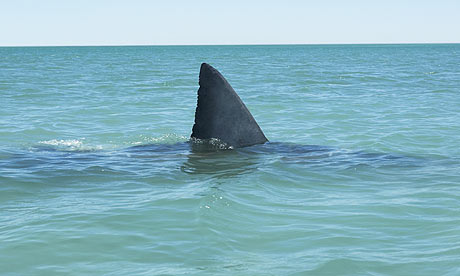United Kingdom could end up with several changes by 2080, including the visits of Great White sharks

Great white sharks could be regular visitors to the coast by the 2080s, where they could find more bathers enjoying the Mediterranean climate. Photograph: Martin Barraud/Getty
Public health
The Department of Health predicts about 1,000 more heat-related deaths each year by the 2020s, mainly among sick and elderly people, rising to 2,800 by the 2080s. Warmer weather could help stomach bugs to thrive, and could see an extra 14,000 cases of food poisoning by the 2080s. But warmer winters are expected to save many people from cold-related deaths, with numbers down 14,000 by the 2020s and 29,000 by the 2080s. Malaria could appear in Britain by mid-century if mosquitoes flourish, but is unlikely to pose a major threat. But increased exposure to ultra-violet light beneath cloudless skies could cause 2,000 extra cases of cataracts each year and 30,000 more cases of skin cancer by the 2050s.Agriculture
Current levels of carbon dioxide in the atmosphere are below the optimum for photosynthesis, so rising carbon emissions could boost growth and yields in the short-term. Longer growing seasons could help too, but drier summers could hit grass production and, without irrigation, some parts of the country could become too dry for many crops. By the 2050s, yields of winter wheat could rise by a quarter, though these gains might be threatened by pests and weeds that could flourish in the new climate. Oilseed rape may struggle, but the range of sunflowers and maize could spread northwards to take its place. By the 2080s, English wine growers could harvest French grape varieties on the slopes of the Lake District.
Wildlife
The range of many plants and animals will shift northwards with the changing weather, but some may be unable to make the journey unaided. Beech trees that find it too warm on the south coast within a few decades might need humans to plant saplings further north, and butterflies squeezed north towards cooler climes could find their route blocked by a shortage of suitable habitat in the midlands. The situation in the sea is simpler, and more octopus and squid could appear in the English Channel and southern waters, as cold water species such as cod head away. Great white sharks could be regular visitors to the coast by the 2080s, where they could find more bathers enjoying the Mediterranean climate.
People
British holidays could boom, but increased visitor numbers could spell problems for footpaths in already overrun and eroded National Parks such as the Lake District. So could heavier winter rainfall. Cafe culture in cities such as Manchester could blossom, but would people be willing to brave the summer heat? By the 2080s, officials may be forced to rejig the school year, with July and August simply too hot for traditional summer holidays. Climate refugees from increasingly arid and drought-struck southern Europe could head towards UK shores.
Sea level and flooding
Ice caps and glaciers do not need to melt for sea level to rise – warmer temperatures are enough because the sea water expands. By the 2020s, this thermal expansion could raise global sea level by 6cm. But the increase around the UK will not be even because the bedrock beneath is gradually tilting, with the south-east sinking. By the 2080s, sea level could be 70cm higher at the southern end of the UK and 50cm up along the northern coast. An estimated 2 million people will be at risk of flooding and there will be a 17-fold increase in flood risk along the east coast. London could face a £25bn clean up bill after a freak storm surge overwhelms the Thames barrier.

0 Comments:
Post a Comment
<< Home